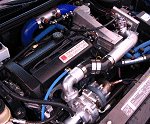

|
Street Class Unlimited Class
DOHC SOHC Ion Updated 1/05 For the most recent list of the fastest five cars click here. |
Tuning Your Turbo Saturn - Part 4by: Qksl2I haven't even really touched on part throttle and light throttle conditions. This is probably the hardest part, and should be dedicated the MOST time of all. You'll be able to get a reasonable and safe high load chart put together pretty quickly. You'll know that you have a good setup when you're a/f ratio is in the mid elevens, you are below the knock threshold, and your EGT's are safe. If you do a first through fourth pull, you want to see roughly 1450 degrees F tops at the end of fourth gear. As I mentioned earlier, I like to add 7 to 8% more fuel at the very top of the RPM band. In the lower gears, you accelerate through them so fast that you won't notice the deadened couple hundred RPM. In the longer gears, this will help keep EGT's down at the top of a long pull. A word on corrections: Many of us don't pay enough attention to correction factors. This is pressure and temperature. Don't tune for just once certain boost level. The interpolation of engine management systems have proven over and over again that theoretical map values do not work! SAE states that given a certain MAP number at a certain RPM, 50 percent of that value at the same RPM has 50% of the required fuel. This is theoretically correct, however, it does not take into consideration the variable pumping losses and efficiency of compressors/heads/cams at such variances. Temperature is the other variable, and every setup will require a different amount of change per degree of temperature variation. Transitions are the key to drivability. That means setting your RPM points to reflect transitions in VE throughout an engine's RPM range. You wont' be able to do this until you drive it. Once you have these set, try to make all changes as gradual as possible. You'll want the lowest enrichment values possible to ensure that your raw fuel curve can take care of the engine function as a whole. You don't want you're a/f to change rapidly as boost comes up. Some tuners will run 14:1 a/f until several pounds of boost and then drop it like it's hot to 12:0. This attempt to help "spool up" just gets you closer to a knock threshold and can even go as far as to increase your EGT's at higher rpm, as you are now starting with a higher base EGT. Also, your VE's will change much more slowly under vacuum and partial throttle than under boost. Once you are under boost, small changes in VE mean big changes in airflow, and more drastic changes will be necessary. Tune safe. You might lose 7-8whp on a 300whp setup going from 12.5 down to 11.8 a/f. Worth it? Heck yeah. You are closer to RBT, and your running cooler. You might actually pick up power by pulling timing, if you are running too much. Advance 1 degree, pick up 30 lb/ft. Advance another, pick up 12. Advance another, pick up 3 lb/ft but knock goes up. Pull timing 1.5 degrees. Another senario: Making 300whp 22 degrees maximum timing. Knock is kinda high. Pull a degree. 313whp at 21 degrees maximum timing and knock just went down. Why? You had single cycle misfires due to pre-ignition. Pulling timing across the board made each and every combustion process work, instead of some working very well and others being beyond their limits. Watch cyl number 4! Well, I have a lot more to go into about the dynamics of a combustion cycle, but its 1:00am and I have work and school tomorrow, so that's it for now guys. I bet there is some seriously shittay grammar and spelling in the above article, but I don't' feel like reading the whole 4 pages over again. I kinda just wrote whatever came to my head, so I know it isn't organized as well as it should be, but I will update it more in the future. Stay tuned, and I really hope this helps! Don't understand some of the terms, like VE or MAP? Search!!!! -Ian |
|



